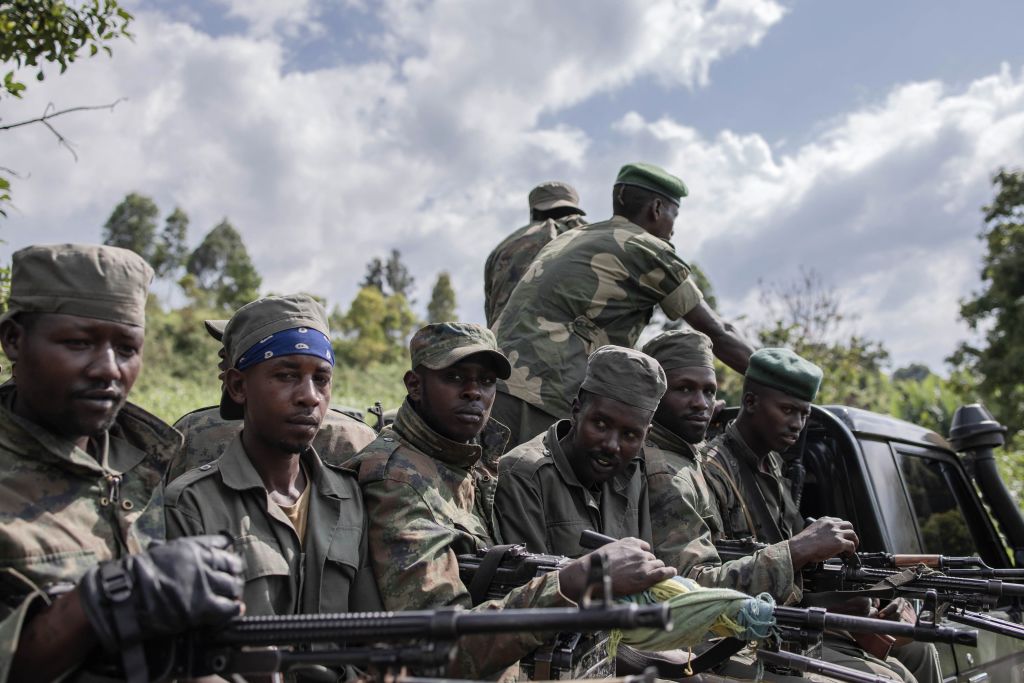ADF STAFF
The residents of Kishishe and Bumba, small villages in eastern Democratic Republic of the Congo (DRC), ran for their lives as members of the rebel M23 terrorist group massacred their families in late November 2022.
Rebels killed between 130 and more than 270 people, mostly civilians, in the attack, according to U.N., media and local government reports. At least 27 women and girls reportedly were raped, some people were abducted and homes were looted. Survivors walked 40 to 60 kilometers to arrive at a camp for displaced people in Kitshanga.
A young man named Samuel said he saw six people dead, including three members of his family.
“The M23 rebels started shooting everywhere,” Samuel told Agence France-Presse (AFP). “I decided to run away, and it took me a week to get to Kitshanga on foot.”
Tuyisenge, a 30-year-old mother, said she was in church when the attack began and was able to escape. Weeping, she said she saw nine people dead.
“I have seven children, but I came here [the Kitshanga camp] with three,” Tuyisenge told AFP. “The other four have disappeared, and my husband, I have no news.”
Information is limited due to the extreme isolation of the village which sits outside of Virunga National Park and is inaccessible by road. A reporter from The East African who visited Kishishe in January and interviewed residents reported that the death toll was much lower than has been claimed.
The M23 agreed to a cease-fire on January 12 after meeting with former Kenyan President Uhuru Kenyatta, facilitator for the East African Community peace process in eastern DRC. Under the agreement, the group is to withdraw fighters from North Kivu Province where Kishishe and Bumba are located, according to Kenyan newspaper The Daily Nation.
The M23 also asked Kenyatta to ensure that all armed groups in eastern DRC cease any fighting and attacking the M23. The M23 ignored a previous ceasefire signed six days before the massacre.
Soldiers from the multinational East African Regional Force, known as EACRF, pledged to continue safeguarding areas vacated by rebel groups.
“EAC forces will continue to coordinate M23’s systematic retreat and asks other armed groups to put down their weapons,” said General Emmanuel Kaputa Kasenga, deputy commander of the East African contingent.
But analysts cautioned that M23 has previously retreated from areas only to regroup and capture new land. According to Jean-Mobert Senga, DRC researcher for Amnesty International, for peace to gain momentum the country needs to fully implement a disarmament, demobilization and reintegration (DDR) program for fighters and address local concerns such as land rights, access to natural resources and issues surrounding ethnicity.
“At the end of the day, the question is really addressing the causes of M23 and other armed groups and we are extremely far away from that objective,” Senga said while appearing on Al-Jazeera. “As long as these issues have not been addressed, they might withdraw but they could actually come back later on.”
Fears of continued violence were realized on January 15 when the Islamic State claimed responsibility for a church bombing in Kasindi that killed 14 people as they prayed.
Observers believe peacekeepers must offer the space and stability for diplomatic efforts to progress. To date, the DRC government has refused to sit at the negotiating table with M23 rebels.
“The simmering challenge created by the M23’s relaunch in 2021 has now become a full-fledged security and humanitarian crisis,” the International Crisis Group wrote noting that 180,000 people were displaced in the month of November. “It is vital to advance on the diplomatic track to halt the M23’s advance, which at present is stirring up other armed groups …”

